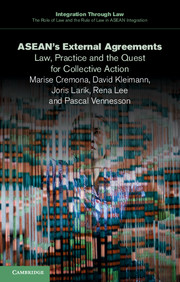Book contents
- Frontmatter
- Contents
- List of tables
- List of charts
- General editors' preface
- 1 Introduction
- 2 The legal and institutional framework for ASEAN external agreements: the centrality of ASEAN
- 3 An inventory and typology of ASEAN external instruments: overview and trends
- 4 ASEAN as a contracting party
- 5 Beyond market access? The anatomy of ASEAN's preferential trade agreements
- 6 A regional strategy: a typology of ASEAN partnership and co-operation agreements
- 7 Between great-power rivalries and supranationality: ASEAN external instruments and regional hedging strategies
- Executive summary
- Appendices
- Index
5 - Beyond market access? The anatomy of ASEAN's preferential trade agreements
Published online by Cambridge University Press: 05 May 2015
- Frontmatter
- Contents
- List of tables
- List of charts
- General editors' preface
- 1 Introduction
- 2 The legal and institutional framework for ASEAN external agreements: the centrality of ASEAN
- 3 An inventory and typology of ASEAN external instruments: overview and trends
- 4 ASEAN as a contracting party
- 5 Beyond market access? The anatomy of ASEAN's preferential trade agreements
- 6 A regional strategy: a typology of ASEAN partnership and co-operation agreements
- 7 Between great-power rivalries and supranationality: ASEAN external instruments and regional hedging strategies
- Executive summary
- Appendices
- Index
Summary
Introduction
Booming East Asia has been particularly active in negotiating intraregional and interregional trade and investment agreements during the past decade. With only three PTAs on record by the year 2000, there are now fifty-nine bilateralor plurilateral accords that involve at least one Asian nation as a signatory. At first sight, the increasing intensity of East Asian intraregional economic integration activity appears to have created a high degree of complexity through the overlap of membership and substantive obligations of the agreements concerned – rather than legal clarity, certainty and predictability for businesses.
At the centre of what has been labelled the East Asian ‘noodle bowl’, ASEAN internal economic integration has steadily progressed since the conclusion of the ASEAN FTA (AFTA) in 1992 and is now geared towards the achievement of the ASEAN Economic Community (AEC) by 2016.
The second layer of regional obligations was created by the conclusion of plurilateral PTAs between ASEAN member states and six of ASEAN's dialogue partners, notably China (entry into force 2005), Korea (2007), Japan (2008) and India (2010), as well as Australia and New Zealand (2010). Due to their plurilateral character, these ASEAN + 1 PTAs also bind ASEAN member states inter se.
Adding a third layer of regional integration, ASEAN's six external PTA partners have concluded, or are in the process of negotiating, separate and parallel PTAs with up to seven individual ASEAN member states. Furthermore, these countries have – outside the realm of ASEAN member states’ involvement – concluded PTAs among each other – the latest incidence of which is the announcement of trilateral negotiations between China, Korea and Japan. At the same time, all of the actors mentioned above have been actively engaged in the negotiation of PTAs with other Asian and non-Asian economies.
- Type
- Chapter
- Information
- ASEAN's External AgreementsLaw, Practice and the Quest for Collective Action, pp. 134 - 235Publisher: Cambridge University PressPrint publication year: 2015



